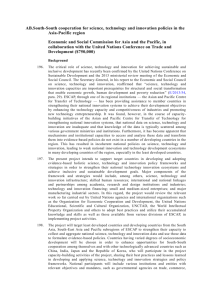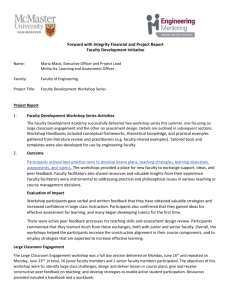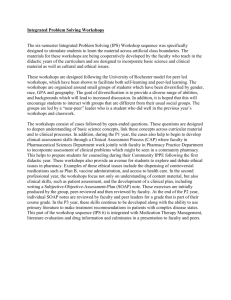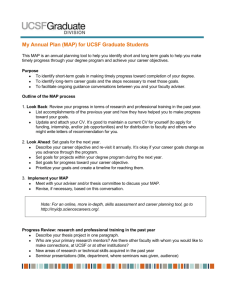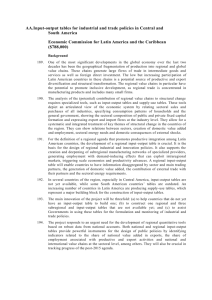Programme for statistics and data
advertisement
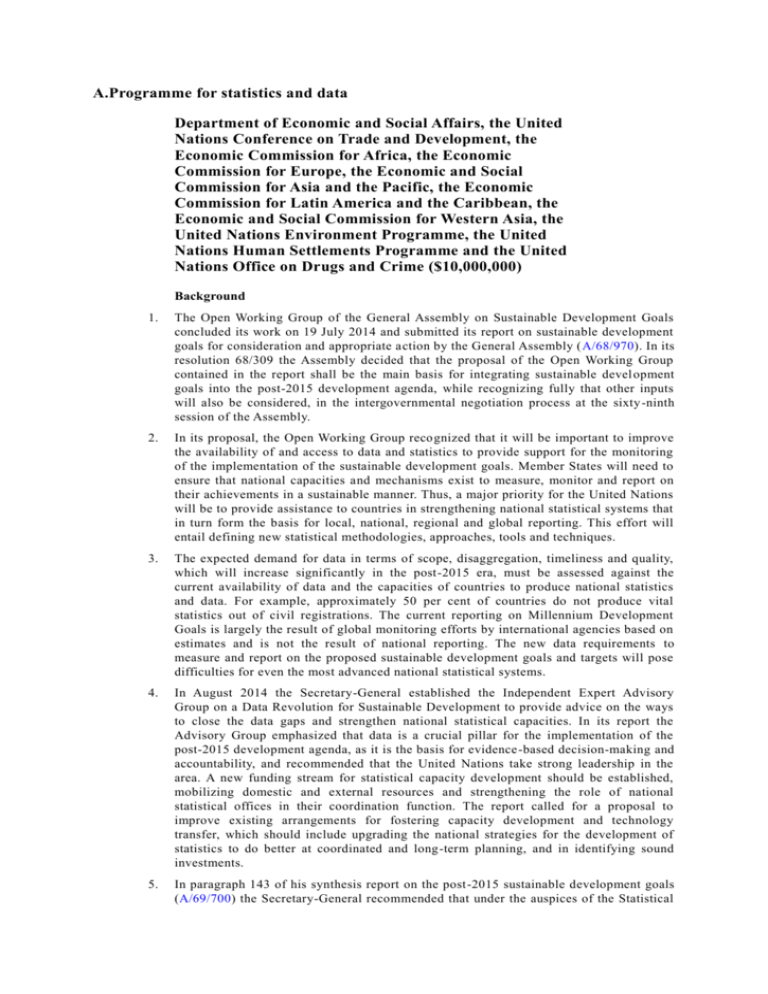
A.Programme for statistics and data Department of Economic and Social Affairs, the United Nations Conference on Trade and Development, the Economic Commission for Africa, the Economic Commission for Europe, the Economic and Social Commission for Asia and the Pacific, the Economic Commission for Latin America and the Caribbean, the Economic and Social Commission for Western Asia, the United Nations Environment Programme, the United Nations Human Settlements Programme and the United Nations Office on Drugs and Crime ($10,000,000) Background 1. The Open Working Group of the General Assembly on Sustainable Development Goals concluded its work on 19 July 2014 and submitted its report on sustainable development goals for consideration and appropriate action by the General Assembly (A/68/970). In its resolution 68/309 the Assembly decided that the proposal of the Open Working Group contained in the report shall be the main basis for integrating sustainable devel opment goals into the post-2015 development agenda, while recognizing fully that other inputs will also be considered, in the intergovernmental negotiation process at the sixty -ninth session of the Assembly. 2. In its proposal, the Open Working Group recognized that it will be important to improve the availability of and access to data and statistics to provide support for the monitoring of the implementation of the sustainable development goals. Member States will need to ensure that national capacities and mechanisms exist to measure, monitor and report on their achievements in a sustainable manner. Thus, a major priority for the United Nations will be to provide assistance to countries in strengthening national statistical systems that in turn form the basis for local, national, regional and global reporting. This effort will entail defining new statistical methodologies, approaches, tools and techniques. 3. The expected demand for data in terms of scope, disaggregation, timeliness and quality, which will increase significantly in the post-2015 era, must be assessed against the current availability of data and the capacities of countries to produce national statistics and data. For example, approximately 50 per cent of countries do not produce vital statistics out of civil registrations. The current reporting on Millennium Development Goals is largely the result of global monitoring efforts by international agencies based on estimates and is not the result of national reporting. The new data requirements to measure and report on the proposed sustainable development goals and targets will pose difficulties for even the most advanced national statistical systems. 4. In August 2014 the Secretary-General established the Independent Expert Advisory Group on a Data Revolution for Sustainable Development to provide advice on the ways to close the data gaps and strengthen national statistical capacities. In its report the Advisory Group emphasized that data is a crucial pillar for the implementation of the post-2015 development agenda, as it is the basis for evidence -based decision-making and accountability, and recommended that the United Nations take strong leadership in the area. A new funding stream for statistical capacity development should be established, mobilizing domestic and external resources and strengthening the role of national statistical offices in their coordination function. The report called for a proposal to improve existing arrangements for fostering capacity development and technology transfer, which should include upgrading the national strategies for the development of statistics to do better at coordinated and long-term planning, and in identifying sound investments. 5. In paragraph 143 of his synthesis report on the post-2015 sustainable development goals (A/69/700) the Secretary-General recommended that under the auspices of the Statistical Commission of the United Nations, a comprehensive programme of action on data be established. This effort includes the building of a global consensus, applicable principles and standards for data, a web of data innovation networks to advance innovation and analysis, a new innovative financing stream to provide support for national data capacities and a global data partnership to promote leadership and governance. In particular, the synthesis report highlights that enhanced national and international statistical capacities, rigorous indicators, reliable and timely data sets, new and non traditional data sources and broader and systematic disaggregation to reveal inequities will all be fundamental for implementing the new agenda. 6. Since its inception, the Development Account has had a strong focus on statistics, with more than 40 projects implemented that provided support for the transfer of knowledge on statistical methodologies, tools and techniques. The proposed programme on statistics and data under the tenth tranche is a new and innovative approach that brings the 10 implementing entities of the Secretariat together, capitalizing on their individual technical expertise and comparative advantages, with a common objective to help developing countries face the data challenges of the new development agenda. The programme will be implemented as a unified and struc tured whole, rather than an amalgamation of individual projects and proposals, and will build on the ongoing dialogues, panels, debates and intergovernmental discussions that will shape and finalize the post-2015 development agenda and sustainable develop ment goals. It will be further developed and amplified as the intergovernmental discussions and negotiations evolve, during 2015, with the intention to launch activities under the programme immediately in January 2016, upon approval of the General Assembly. 7. The programme explicitly responds to two targets formulated by the Open Working Group of the General Assembly under goal 17 (strengthen the means of implementation and revitalize the global partnership for sustainable development), under the heading “Data, monitoring and accountability” of the sustainable development goals, as presented: (a) Target 17.18: by 2020, enhance capacity-building support to developing countries, including for least developed countries and small island developing States, t o increase significantly the availability of high-quality, timely and reliable data disaggregated by income, gender, age, race, ethnicity, migratory status, disability, geographic location and other characteristics relevant in national contexts; (b) Target 17.19: by 2030, build on existing initiatives to develop measurements of progress on sustainable development that complement gross domestic product and support statistical capacity-building in developing countries. Objective of the Objective of the Organization: To strengthen the statistical capacity of developing countries to measure, monitor and report on the sustainable development goals in an accurate, reliable and timely manner for evidence -based policymaking Relationship to the biennial programme plan for the period 2016-2017: Economic and social affairs subprogramme 4 (Statistics); Trade and development subprogramme 1 (Globalization, interdependence and development); Human settlements subprogramme 7 (Research and capacity development); International drug control, crime and terrorism prevention and criminal justice subprogramme 6 (Research, trend analysis and forensics); Economic and social development in Africa subprogramme 4 (Statistics); Economic and social development in Asia and the Pacific subprogramme 7 (Statistics); Economic development in Europe subprogramme 3 (Statistics); Economic and social development in Latin America and the Caribbean subprogramme 11 (Statistics); Economic and social development in Western Asia subprogramme 5 (Statistics for evidence-based policymaking) Summary budget (Thousands of United States dollars) General temporary assistance Consultants Expert group Travel Contractual services Operating expenses Seminars, workshops Total 350.0 3 000.0 750.0 1 800.0 700.0 200.0 3 200.0 10 000.0 Expected accomplishments of the Secretariat Indicators of achievement (EA1) Enhanced capacity of developing countries to strengthen statistical institutional environments to measure, monitor and report on the sustainable development goals (IA1.1) Number of target countries that have adopted revised national strategies for the development of statistics based on inputs from the programme (IA1.2) Number of country participants trained who confirm increased understanding of the institutional arrangements required for measuring the sustainable development goals (IA1.3) Number of countries that establish institutional mechanisms to foster dialogue between users and producers of statistics in the context of the sustainable development goals (EA2) Strengthened capacity in developing countries to improve statistical production processes to address increased data needs across multiple statistical domains (IA2.1) Number of improved statistical production processes in countries to measure specific sustainable development goals indicators and targets based on inputs from the programme (EA3) Strengthened capacity in developing countries to measure and monitor indicators and targets in new statistical and data areas (IA3.1) Number of countries that started reporting in new areas where the programme provided support (EA4) Enhanced leveraging, partnerships and collaboration by United Nations system and other partners to help countries strengthen their national statistical systems for measuring the sustainable development goals (IA4.1) Number of partnerships created within the United Nations system to provide support for statistical strengthening at the national level in the context of the sustainable development goals with the input of the programme (IA4.2) Number of partnerships created with external partners to provide support for statistical strengthening at the local, national, regional and international levels (IA4.3) Number of countries that are supported by the programme in mobilizing financial resources for strengthening national statistical systems Main activities 21. The main activities of the project will include: (A1.1) Organize regional/subregional workshops on the post-2015 agenda and the sustainable development goals, targets and indicators, and the implementation of the required indicators and monitoring framework; (A1.2) Carry out consultant and advisory missions to target countries to complet e a gap analysis reviewing the institutional environment and prepare revised national strategies for the development of statistics and an implementation plan for the monitoring of the sustainable development goals and targets; (A1.3) Organize national multi-stakeholder workshops to create awareness about and define national strategies for the development of statistics and to address national capacity-building strategies in specific areas; (A1.4) Organize subregional/international workshops to share less ons learned from revising national strategies for the development of statistics; (A1.5) Carry out advisory missions to selected countries to provide assistance with strengthening their institutional settings; (A2.1) Identify statistical production processes where improvements could help to substantially strengthen data measuring and collection for sustainable development goals and lead to more efficient and effective statistical production processes; (A2.2) Provide a consultant to assist with the drafting of revised guidance, methodologies and/or handbooks on statistical production processes for the compilation of sustainable development goals indicators; (A2.3) Convene expert group meetings to revise the guidance, methodologies and/or handbooks for statistical production processes for the compilation of sustainable development goals indicators; (A2.4) Finalize handbooks/guidance for training workshops for the compilation of sustainable development goals indicators; (A2.5) Organize national workshops to train statisticians in the revised guidance/methodologies for the production processes for the compilation of sustainable development goals indicators; (A2.6) Carry out advisory missions to help countries to implement the revised production processes; (A2.7) Organize regional/subregional/international workshops to share lessons learned from implementation of new/revised production processes and disseminate information to a wider audience; (A2.8) Disseminate best practices and lessons learned at international/regional statistical meetings; (A2.9) Finalize handbooks for methodologies and adapt the handbooks to specific country or regional settings; (A2.10) Develop e-learning courses at the regional/subregional and/or international levels on the new/revised processes; (A2.11) Disseminate lessons learned through websites and publications; (A3.1) Draft handbooks/guidelines for new methodologies for data collection and statistical production processes for a limited number of sustainable development goals indicators; (A3.2) Organize expert group meetings to revise the methodologies and/or handbooks; (A3.3) Finalize handbooks for training workshops for data collection and statistical production processes for a limited number of sustainable development goals indicators; (A3.4) Organize national workshops to train statisticians on the new methodologies; (A3.5) Carry out advisory missions to help countries to implement the new methodologies; (A3.6) Organize regional/subregional/international workshops to share lessons learned from implementation of new methodologies and disseminate information to a wider audience; (A3.7) Organize side events and workshops at international meetings to train statisticians in the use of the methodologies; (A3.8) Finalize handbooks for methodologies and adapt the handbooks to specific country or regional settings; (A3.9) Develop e-learning courses at the regional/subregional and/or international levels on the new methodologies; (A3.10) Disseminate lessons learned through websites and publications; (A4.1) Work with the United Nations system and external partners on leveraging existing statistical programmes and forging partnerships; (A4.2) Collaborate with partners in the execution of the programme at the national/regional and global levels in the specific areas of statistics; (A4.3) Coordinate programme activities with partners and target countries. [A/70/6 Sect. 35)] A: Programme for Statistics and Data Implementing entities: DESA, UNCTAD, ECA, ECE, ESCAP, ECLAC, ESCWA, ENEP, UN-Habitat and UNODC Duration: 2016 – 2019 Objective: To strengthen the statistical capacity of developing countries to measure, monitor and report on the SDGs in an accurate, reliable and timely manner for evidence based policy making Summary budget (Thousands of United States dollars) General temporary assistance 350.0 Consultants 3 000.0 Expert group 750.0 Travel 1 800.0 Contractual Services 700.0 Operating expenses 200.0 Seminars, Workshops3 200.0 Total 10 000.0 Detailed budget (US dollars) General Temporary Assistance Temporary assistance to assist with the implementation of the different programme components during peak loads; develop, coordinate and organize virtual training courses, in support of all activities (35wm x $10,000) Consultants International consultants $1,200,000 International consultants for the task(s) of preparing training materials, organizing workshops, preparing reports and providing advice to target countries in support of all activities (110 work months x $9,000) In support of the midterm evaluation of the project: 6wm x $15,000 = $90,000; In support of the final evaluation of the project: 8 work months x $15,000 = $120,000 National / Regional consultants $1,800,000 National/regional consultants for task(s) of preparing national case studies, training materials, holing national workshops, preparing reports and providing advice to national governments in support of all activities(300 work months x $6,000); Expert Group Fifteen Expert Group Meetings for the purpose of reviewing training materials, publications and providing inputs into methodologies in support of A2.3 and A3.2 (15 x $50,000) Travel of Staff Three hundred Missions by staff from all implementing entities for supporting all activities (300 x $6,000) Contractual Services For translation, interpretation, preparation of publications, printing, executing national components and hosting e-learning 350 000 3 000 000 750 000 1 800 000 700 000 6 [A/70/6 Sect. 35)] workshops in support of all activities Operating Expenses (a) Communications In support of all activities 200 000 (b) Other general operating expenses In support of all activities Seminars, Workshops and Study Tours Ten international workshops in support of A1.1, A2.7 and A3.6. (10 x $70,000) Forty Regional/subregional workshops, in support of A1.1, A2.7 and A3.6. (40 x $50,000) Fifty National workshops in support of A2.5 and A3.4 (50 x $10,000) 3 200 000 7
